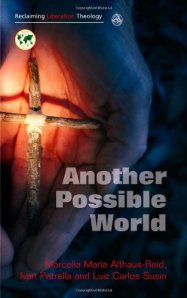
This week, as has become customary every couple of years or so, I re-read Marcella Althaus-Reid’s contribution to the book Another Possible World, a 2005 compilation of conference papers evaluating the state of then-contemporary theologies of liberation. In her essay she accuses, not only the usual targets, (mainstream, “European” theologies) but liberationist thought itself of being incapable of thinking rigorously about the intersection of poverty, class, and queer bodies. Althaus-Reid ties this inability to a number of factors: for instance, liberationist thinking is militarist and identitarian in a way that predisposes it to concessions of efficacy and expedience. Thus, the poor is most prominently poor, straight, males, and once those problems are addressed, [for the liberationist] we can move on to include women, queer folk, etc. It’s important not to read her point reductively: it’s not that liberationists are secret queer-phobes, or that they would claim to be doing this prioritizing, but instead these priorities play out at the level of material relations. A radical sermon from the likes of James Cone, she notes, seems easier for militant churches to receive than the actual concrete relations implied by the collision of cultural and sexual difference in their midst. Also important to note is the way that the target of Reid’s ire is not merely exclusive, but in fact inclusive rhetoric. She doesn’t spend a lot of time on this particular point, but I want to draw attention here. Because of the formal properties (the closure) of inclusionary process, inclusionary self-identity can’t receive difference as such uncolonially, no matter how transgressive the identity is upon which inclusion is based.
Queer is, it seems to me, for a number of reasons, the one predicative identity that gets closest to the ability to do some theological work. Its etymology and history are both really nicely suggestive, and thus tempting to take up in a certain way (for me, even more tempting, etymologically, than, say, “poor” or “oppressed”). The word, in its earliest use, carries connotations of “de-centered,” “oblique.” It’s not hard to see why, especially working from an apocalyptic framework, the word is ecclesiologically attractive. The trouble, though, is that there’s a certain sedentary nature to (even that!) naming that makes a home in a world where there really are “straights” to hate and name “queers.” I really do believe that we are to live and work and gather in a way that can only be called “queer” by a “straight” world, and that’s part of what makes it tempting to embrace such a name for oneself. The word “queer” comes to “queer” folk as violence from the beginning, however, and to proclaim a shared “queerness” with those to whom that name has come not by choice is to forget that violence. If we are to be called queer, it can only be insofar as a straight world recognizes us as something that does not fit, and as already-queer folks recognize us as folks who are cast out alongside them. All that requires living, and working, and gathering in a certain way, and it requires gathering in a way that isn’t so much about inviting already-called-queer people into something (perhaps a place where the name Christian might come to them) but instead to a kind of intermingling to the point that we might become indistinguishable.
This, to me, as many things do, points back to that discursive aporia of Christian theology Lucas gestures towards in his first post. Christian attempts to think the significance of queer bodies theologically have historically had very little to say that can register meaningfully as “good news” to queer folk. In light of a long history of Christian violence, it seems rather hard to imagine “well, now you can join too” as news anybody’s going to really appreciate. This isn’t to denigrate open and affirming congregations; if anything, I’m saying that’s the least a little local church could do. Perhaps what I’m saying is that any attempt to move beyond the discursive aporia is going to have to be reckoned by its ability to think beyond the given categories for sexual discourse in the contemporary West, and is going to have to be radically unconcerned with its own self-identity. It’s going to have to be a way of thinking, say, the significance of the person Jesus, that neither insists on a sort of originary harmony in denial of the violence that underwrites the contemporary order nor leaves the maimed and silenced and killed with no place to stand and no word to say.
